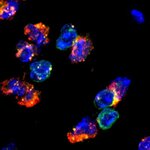
Vitamin D is being blamed for or is linked to curing everything in 2015, and so it is little surprise a paper uses a genetic study to bolster observational evidence that lower vitamin D levels are associated with increased risk of multiple sclerosis.
Multiple sclerosis is a debilitating autoimmune disease that affects the nerves in the brain and spinal cord. There is no known cure for multiple sclerosis and it usually presents between the ages of 20 and 40 years. While some observational evidence suggests there may be a link between lower vitamin D levels and multiple sclerosis risk, it…



